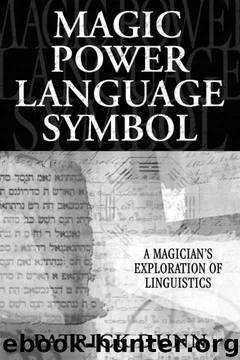Magic, Power, Language, Symbol: A Magician's Exploration of Linguistics by Patrick Dunn

Author:Patrick Dunn [Dunn, Patrick]
Language: eng
Format: epub
Published: 2009-12-15T18:27:00+00:00
Meaning
Glossolalia as a magical technique calls into question what we mean by "meaning" and demands at least a brief explanation of how meaning interacts with information. While to my knowledge no one has discovered a mathematical relationship for meaning,98 we can make some rough and handy general statements about meaning that are useful for a magician to be aware of. After all, magic isn't science-if it were, we'd call it "science."
We know that for small messages, those containing very little information, meaning increases as information increases. For example, the word the contains little information (it just indicates that the noun following it is definite) and little meaning. The word banana contains much more information and much more meaning (it denotes a particular kind of fruit). At this point, we could simply decide that meaning and information are exactly the same thing, but at higher levels of information, meaning begins to lag behind information, and at some point, meaning actually decreases as information increases. For example, in an ambiguous statement, two possible meanings exist at the same time, and it's impossible to determine which was really "meant." Does the word unbuttonable mean "can't be buttoned" or "can be unbuttoned"? Furthermore, when we increase information dramatically, meaning all but disappears-take for example the incredible amount of information available on the World Wide Web. Much of it is meaningless simply because there is so much of it. In fact, "noise" is simply too much information to make meaning from-imagine a crowded restaurant with many people talking at once. This is an information-rich environment, but it becomes increasingly difficult to construct meaning from the randomness.
Meaning, therefore, is subtractive after a certain point-meaning is what we extract from a body of information and decide to highlight. It may be that one person has a higher threshold of meaningfulness than another, and this is why a magician can look at a random array of tarot cards, for example, and find meaning, or why a Pentecostal Christian can hear the meaningless information of someone speaking in tongues and reduce it to at least one meaning. With the unbuttonable example, when we select a meaning, we collapse the word into meaning and discard the other possibility. No one has actually done this with unbuttonable, but the word inflammable used to mean "likely to catch fire." The in- prefix, however, contains two possible meanings: an intensifying meaning and a negative meaning, so many people assumed that inflammable meant "not likely to catch fire." It's important to make that distinction clear! One might argue that it "really meant" the prior meaning, but in fact it meant what people wanted it to mean. By sending the message, I may have meant "Watch out!" but you may have discarded a different part of the message (one of its possible meanings) and decided it meant "Don't worry." We solved this language problem by coining a new word, flammable, which no one could misinterpret.
I've already argued that glossolalia is not devoid of information, but that it contains pragmatic and emotional information rather than semantic information.
Download
This site does not store any files on its server. We only index and link to content provided by other sites. Please contact the content providers to delete copyright contents if any and email us, we'll remove relevant links or contents immediately.
Cecilia; Or, Memoirs of an Heiress — Volume 1 by Fanny Burney(32548)
Cecilia; Or, Memoirs of an Heiress — Volume 2 by Fanny Burney(31947)
Cecilia; Or, Memoirs of an Heiress — Volume 3 by Fanny Burney(31931)
The Lost Art of Listening by Michael P. Nichols(7494)
Asking the Right Questions: A Guide to Critical Thinking by M. Neil Browne & Stuart M. Keeley(5759)
We Need to Talk by Celeste Headlee(5608)
On Writing A Memoir of the Craft by Stephen King(4935)
Dialogue by Robert McKee(4389)
Pre-Suasion: A Revolutionary Way to Influence and Persuade by Robert Cialdini(4224)
I Have Something to Say: Mastering the Art of Public Speaking in an Age of Disconnection by John Bowe(3873)
Elements of Style 2017 by Richard De A'Morelli(3343)
The Book of Human Emotions by Tiffany Watt Smith(3303)
Fluent Forever: How to Learn Any Language Fast and Never Forget It by Gabriel Wyner(3079)
Name Book, The: Over 10,000 Names--Their Meanings, Origins, and Spiritual Significance by Astoria Dorothy(2979)
Why I Write by George Orwell(2945)
Good Humor, Bad Taste: A Sociology of the Joke by Kuipers Giselinde(2944)
The Art Of Deception by Kevin Mitnick(2796)
The Grammaring Guide to English Grammar with Exercises by Péter Simon(2740)
Ancient Worlds by Michael Scott(2682)
